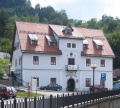Mercury mining heritage
With the world's second largest mercury mine, Idrija was considered for centuries to be the centre of scientific and technological progress in the region. The history of mining in Idrija dates back 1490. By burning cinnabar ore, the mercury miners of Idrija mined over 13 per cent of the world's production. Only Almadén mercury mine in Spain was bigger and dates back to the Roman times. Until World War I the Idrija Mercury Mine was one of the best technically equipped mines in Europe. In 1995 the mine was closed down due to commercial, geological, and ecological reasons but some of its shafts and facilities remain open for tourists. Since then the company has been under the liquidation, because it still needs to manage the consequences of 500 years of mining, that is to secure the shafts and to monitor the pollution to the environment.
Together with the Idrija Municipal Museum, the Idrija Mine Museum takes care of the region's rich technical, geological, technological, ethnological, and cultural heritage. In 2012 the Heritage of Mercury. Almadén and Idrija project was submitted to UNESCO and both cities were included on its World Heritage List.
Articles in category "Mercury mining heritage"
The following 11 pages are in this category, out of 11 total.
Media in category "Mercury mining heritage"
The following 12 files are in this category, out of 12 total.
- Film Theatre Idrija 2014 Miners Theatre.JPG 1,920 × 1,080; 759 KB
- Idrija Mine Museum 2006 entrance.jpg 1,299 × 1,173; 218 KB
- Idrija Mine Museum 2011 Photo Stephen Colebourne.jpg 4,000 × 2,248; 1.91 MB
- Miner's House Idrija 2007 bread stove tools.JPG 1,536 × 2,048; 334 KB
- Miner's House Idrija 2007 closet.JPG 1,536 × 2,048; 341 KB
- Miner's House Idrija 2007 fireplace.JPG 2,048 × 1,536; 395 KB
- Miner's House Idrija 2007.JPG 1,536 × 2,048; 442 KB
- Miner's House Idrija 2007 lace making table.JPG 1,536 × 2,048; 337 KB
- Miner's House Idrija 2007 sink.JPG 1,536 × 2,048; 418 KB
- Municipality of Idrija 1689 Valvasor.jpg 955 × 768; 187 KB
- Municipality of Idrija 1840.jpg 793 × 576; 816 KB
- Municipality of Idrija 2008.jpg 1,600 × 1,200; 1.31 MB














